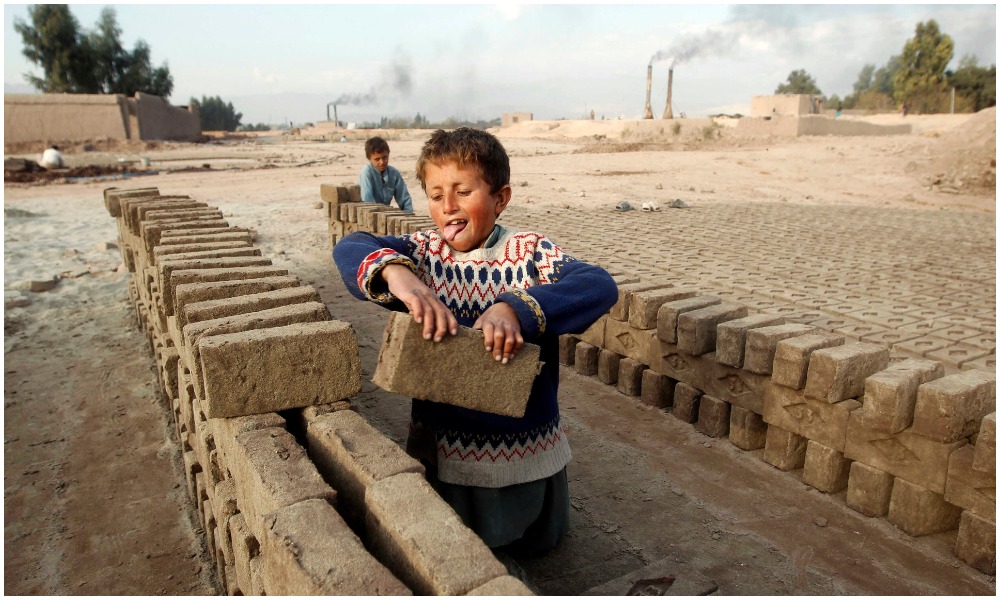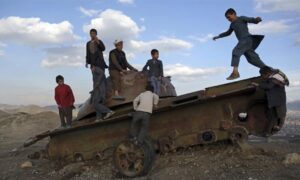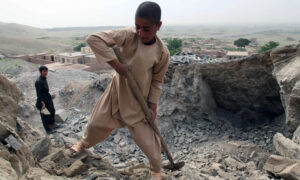Latest News
Over one million Afghan children engaged in hard labor: ILO
Factors such as economic poverty, conflicts, crises and the COVID pandemic have forced millions of children to do hard labor around the world.

The International Labor Organization (ILO) says almost 1.1 million children are engaged in hard labor in Afghanistan.
At a gathering in Kabul on the occasion of World Day Against Child Labor, ILO officials said that most of these children are between the ages of 5 and 17 and child labor in the country should be stopped.
“According to the latest survey, 1.06 million children between the ages of 5 and 17 have been working, which is 9 percent [of the population in that age group],” said Ramin Behzad, the Senior Coordinator for Afghanistan at the ILO.
Factors such as economic poverty, conflicts, crises and the COVID pandemic have forced millions of children to do hard labor around the world, but children in Afghanistan are more affected than any other country, ILO added.
“2020, we did an assessment and the figures were published in 2021. Since then, we have not conducted a general survey in Afghanistan to say more precisely whether this number increased or decreased; but we guess that the figures may have increased,” said another official of ILO.
Meanwhile, the officials from the Ministry of Labor and Social Affairs said that the process of collecting and supporting working children continues in the country.
Humanitarian crisis driving children to work
Last month, Save the Children stated that about 6.5 million children in Afghanistan – or nearly three out of ten – will face crisis or emergency levels of hunger this year as the country feels the immediate impacts of floods, the long term effects of drought and the return of Afghans from Pakistan and Iran.
New figures from the global hunger monitoring body, the IPC forecast that 28% of the population – or about 12.4 million people – will face acute food insecurity before October. Of those, nearly 2.4 million are predicted to experience emergency levels of hunger, which is one level below famine.
The figures show a slight improvement from the last report in October 2023, but underline the continuing need for assistance, with poverty affecting one in two Afghans.
An estimated 2.9 million children under the age of five are projected to suffer from acute malnutrition in 2024 . Since the start of 2024, Save the Children’s health teams and clinics in Afghanistan have treated more than 7,000 children for malnutrition, among them 11 year old Firoz who lives in Northern Afghanistan with his 10 brothers and sisters.
His father is a farmer, but the 3-year-long drought has forced him to take on other work to support the family.
One doctor who works for a Save the Children health team in Northern Afghanistan said people are facing serious financial problems.
“From an agricultural standpoint, they have land but don’t have water or adequate land for farming – they are jobless. These things affect children. When children are affected, they may not be able to go to school or may become busy working to find food for their homes. They become deprived of their rights or become ill and malnourished. All these problems are affecting children.”
Related Stories:
250,000 Afghan children need homes, food, education after returning from Pakistan
One third of Afghan children engaged in hard labor, reports IRC
Latest News
Continued aid to Afghanistan vital for regional security: Kazakh president

Kazakhstan’s President Kassym-Jomart Tokayev has emphasized the continuation of humanitarian assistance to Afghanistan, stating that the ongoing provision of such aid plays an important role in ensuring regional security.
Speaking at the international conference “Peace and Trust” in Ashgabat, the capital of Turkmenistan, Tokayev described addressing complex humanitarian challenges and the reconstruction of Afghanistan as a necessity.
“To ensure regional security, we consider it essential to continue providing assistance to Afghanistan, including by strengthening international efforts to address complex humanitarian issues and the reconstruction of this country. Kazakhstan remains committed to supporting the people of Afghanistan through humanitarian aid, educational projects, trade development, and food security initiatives,” he said.
Meanwhile, experts believe that sustainable improvement of the humanitarian situation in Afghanistan requires broad cooperation from the international community and support for the country’s economic development.
“Investment can be defined as one of the fundamental drivers of the economic cycle, and whenever Afghan traders do not take their money out of the country and instead invest domestically, it naturally leads to greater growth and dynamism in Afghanistan’s economy,” said Abdul Zahoor Modabber, an economic analyst.
As the humanitarian crisis in Afghanistan continues, reports by international relief organizations indicate that millions of citizens of the country are in urgent need of food, health, and livelihood assistance.
The reduction in funding for aid organizations, the impacts of climate change, and the return of migrants have increased concerns about a further deterioration of the humanitarian situation in the country.
Latest News
Islamic Emirate declines to attend Tehran meeting on Afghanistan
Latest News
Sirajuddin Haqqani: A government that intimidates its people is not a true government

Khalifa Sirajuddin Haqqani, Minister of Interior of the Islamic Emirate of Afghanistan, said during a visit to Khost province on Friday that any government which rules through fear cannot be considered a true government.
“A government is one that is loved by its people, one that serves them with respect and compassion, and from whose behavior people learn ethics and sincerity,” he said.
Haqqani also stressed that Afghans who opposed the Islamic Emirate in the past should be tolerated and treated in a way that helps eliminate hostility and animosity, paving the way for national cohesion.
-

 Latest News2 days ago
Latest News2 days agoMuttaqi: Afghanistan’s progress requires both religious and modern education
-

 Sport4 days ago
Sport4 days agoILT20: Desert Vipers edge Gulf Giants in historic super over thriller
-

 Regional4 days ago
Regional4 days agoSix Pakistani soldiers killed in TTP attack in Kurram District
-

 Business4 days ago
Business4 days agoTrade bodies warn almost 11,000 Afghan transit containers stuck at Karachi port
-

 World4 days ago
World4 days agoPowerful 7.6 earthquake hits northern Japan, tsunami warnings issued
-

 Latest News3 days ago
Latest News3 days agoTrump calls Afghanistan a ‘hellhole’ country as US expands immigration restrictions
-

 Sport3 days ago
Sport3 days agoCommanding wins for Arman FC and Sarsabz Yashlar in Afghanistan Champions League
-

 Latest News5 days ago
Latest News5 days agoPakistan’s top general calls on IEA to pick between ties with Islamabad or TTP



























